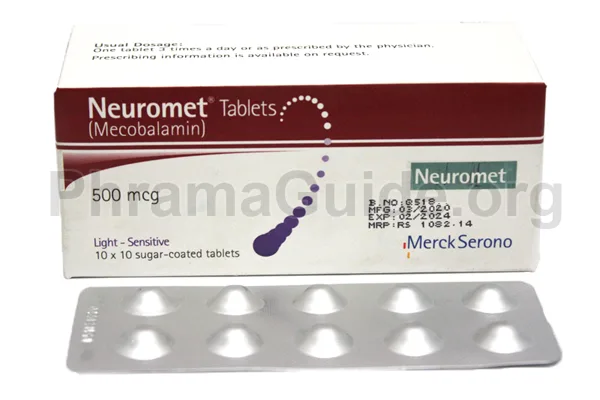Neuromet is a form of vitamin B12, and it is often used as a supplement to treat or prevent vitamin B12 deficiency. It plays a crucial role in various bodily functions, particularly nerve health and the production of red blood cells. While it is generally well-tolerated, there can be side effects associated with its use. Here are common and less common side effects of Neuromet:
Common Side Effects:
- Mild Gastrointestinal Issues: Some individuals may experience mild gastrointestinal side effects, such as nausea, diarrhea, or an upset stomach. These symptoms are usually temporary and subside as the body adjusts to the supplement.
- Headache: Headaches can occasionally occur as a side effect of Neuromet supplementation.
Less Common Side Effects:
- Allergic Reactions: Allergic reactions to Neuromet are rare but possible. Symptoms of an allergic reaction may include hives, itching, swelling, difficulty breathing, and rash. If you experience these symptoms, seek immediate medical attention.
- Low Potassium Levels: In very rare cases, long-term use of Neuromet can lead to low potassium levels in the blood (hypokalemia), which may cause symptoms like muscle weakness, cramps, or irregular heartbeat.
- Skin Rash: Some individuals may develop a skin rash as a result of taking Neuromet. It’s important to consult a healthcare professional if you experience a rash.
- Flushing or Hot Sensation: Some people may experience a sensation of warmth or flushing, which can be a result of improved circulation due to the vasodilatory effects of Neuromet.
- Muscle Pain: Although uncommon, muscle pain or weakness may occur in some individuals taking Neuromet.

What is Neuromet?
Neuromet is one of the leading brands of Mecobalamin, manufactured and marketed by Merck Serono Pharmaceutical.
Neuromet : Available Formulations and Strengths
Presently, Neuromet is available in tablet and injection forms.
Neuromet Tablet : 500mcg strength
Neuromet Injection : 500mcg/ml
What Are The Possible Drug Interactions of Neuromet?
- Colchicine: Neuromet may reduce the absorption of colchicine, a medication used to treat gout. If you are taking colchicine and Neuromet, it’s advisable to separate the dosing by a few hours.
- Metformin: Metformin, a medication used to treat diabetes, may reduce vitamin B12 levels in the body over time. Therefore, individuals taking metformin may benefit from Neuromet supplementation or routine monitoring of B12 levels.
- Aminoglycoside Antibiotics: Long-term use of aminoglycoside antibiotics, such as gentamicin or tobramycin, may reduce vitamin B12 levels in the body. Neuromet supplementation can be considered in individuals on prolonged courses of these antibiotics.
- Proton Pump Inhibitors (PPIs): PPIs, like omeprazole or pantoprazole, are used to reduce stomach acid production and can decrease the absorption of vitamin B12 from food and supplements. While not a direct interaction with Neuromet, long-term use of PPIs may necessitate B12 supplementation.
- H2 Receptor Antagonists: Similar to PPIs, H2 receptor antagonists like ranitidine or famotidine, which are used to reduce stomach acid, can affect the absorption of vitamin B12 and may necessitate supplementation in the long term.
- Methotrexate: High doses of methotrexate, a medication used to treat certain cancers and autoimmune diseases, can interfere with the body’s ability to use vitamin B12. Neuromet supplementation may be necessary in some cases.

Leave A Comment